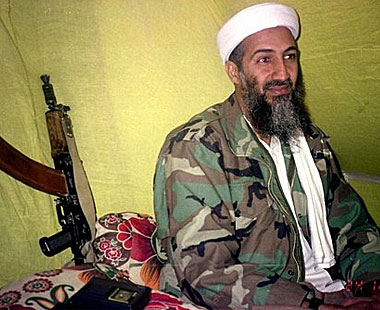 The U.S. military’s killing of Osama bin Laden is a huge victory in the war against terror and on behalf of a safer, freer world.
The U.S. military’s killing of Osama bin Laden is a huge victory in the war against terror and on behalf of a safer, freer world.
But if this is to be the beginning of the end for al Qaeda and repressive governments everywhere, we have to make it our national mission not just to hunt down terrorist leaders, but also to wipe out the single greatest source of their money and power: oil.
From the beginning, Osama bin Laden’s rise was made possible by oil money. He acquired the millions of dollars that allowed him to start and finance al Qaeda from his huge family construction business, which literally paved the way for Saudi Arabia’s massive oil boom. Al Qaeda continues to receive tens of millions of dollars from oil-rich sympathizers in the Gulf. But they’re hardly alone in feeding their brutality with oil.
Libya’s Muammar Gadaffi is able to hang on against an intense NATO campaign largely because of the billions of dollars in oil money he’s stockpiled to pay African mercenaries and buy off potential opponents. Iran’s Mahmoud Ahmadinejad has financed Hezbollah and Hamas and poured billions into a nuclear weapons program with profits from Iran’s huge oil deposits. Further down on the repression scale, Bahrain’s royal family has imported Saudi troops to crush the country’s democratic reform movement, while Vladimir Putin is able to resist calls for openness and economic innovation because of the flood of oil dollars entering his country.
In contrast, Tunisia and Egypt’s relative lack of oil meant that their governments didn’t have the same level of resources to maintain the support of loyalists or try to temporarily buy off their people.
Indeed, not only does oil finance terror and repression, it enables it. According to an extraordinary statistical analysis by UCLA political scientist Michael Ross, a country’s “reliance on either oil or mineral exports tends to make it less democratic,” and “this effect is not caused by other types of primary exports; … it is not limited to the Arabian Peninsula, to the Middle East, or sub-Saharan Africa; and … it is not limited to small states.”
When demand surges and the price of oil rises, terrorist groups are better financed and repressive governments have more resources with which to repress their people and more ability to resist pressure to respect human rights and democratize. As Thomas Friedman describes in his seminal 2006 Foreign Policy article, “The First Law of Petropolitics” (written back when $60 a barrel was a “high” price for oi):
Think about the difference between Putin when oil was in the $20-$40 range and now, when it is $40-$60. When oil was $20-$40, we had what I would call “Putin I.” President Bush said after their first meeting in 2001 that he had looked into Putin’s “soul” and saw in there a man he could trust. If Bush looked into Putin’s soul today — Putin II, the Putin of $60 a barrel — it would look very black down there, black as oil. He would see that Putin has used his oil windfall to swallow (nationalize) the huge Russian oil company, Gazprom, various newspapers and television stations, and all sorts of other Russian businesses and once independent institutions.
This means that when it comes to stopping al Qaeda, Hamas, and Hezbollah, or defunding repressive petro-state governments, Obama’s next big national security question is of a very different sort than the one he made to send forces into Abbottabad, but at least as consequential: It’s a decision whether to raise fuel-efficiency requirements for cars and trucks to 47 or 62 miles per gallon, as outlined in a recent EPA proposal.
Going with the more ambitious option would cut U.S. expenditures on oil by $100 billion over five years, meaning a lot less money going to foreign terrorist groups and petrocracies alike (and it would cut climate pollution by 450 million tons and save drivers $7,000 per year in gas). Of course, American car companies are trotting out the old canard that they’re just not competent enough to deliver, while Toyota Vice President Jim Colon had this to say (h/t Roland Hwang of NRDC):
Whatever goal [the administration] establishes, Toyota will be prepared to meet. If it’s 62 miles a gallon, we’ll be able to achieve that.
In addition to the direct gains, the 62 mpg goal will likely spur even more technological innovation toward cars that don’t rely on oil at all, spurring a global plunge in oil demand over the next decade or two. These disruptive technologies will upend the auto industry, but they’ll be most disruptive to the terrorist groups and regimes that rely on a steady stream of oil money flowing from the United States. And all Americans can do our part in the war on terror by getting out of our cars altogether, and getting on a subway or bicycle instead. Indeed, you might say that terrorists and dictators should be even more afraid of Priuses and bikeshares than drone attacks.
So three cheers for the USA, and a few more for the world’s safe, free, and democratic clean energy future.



